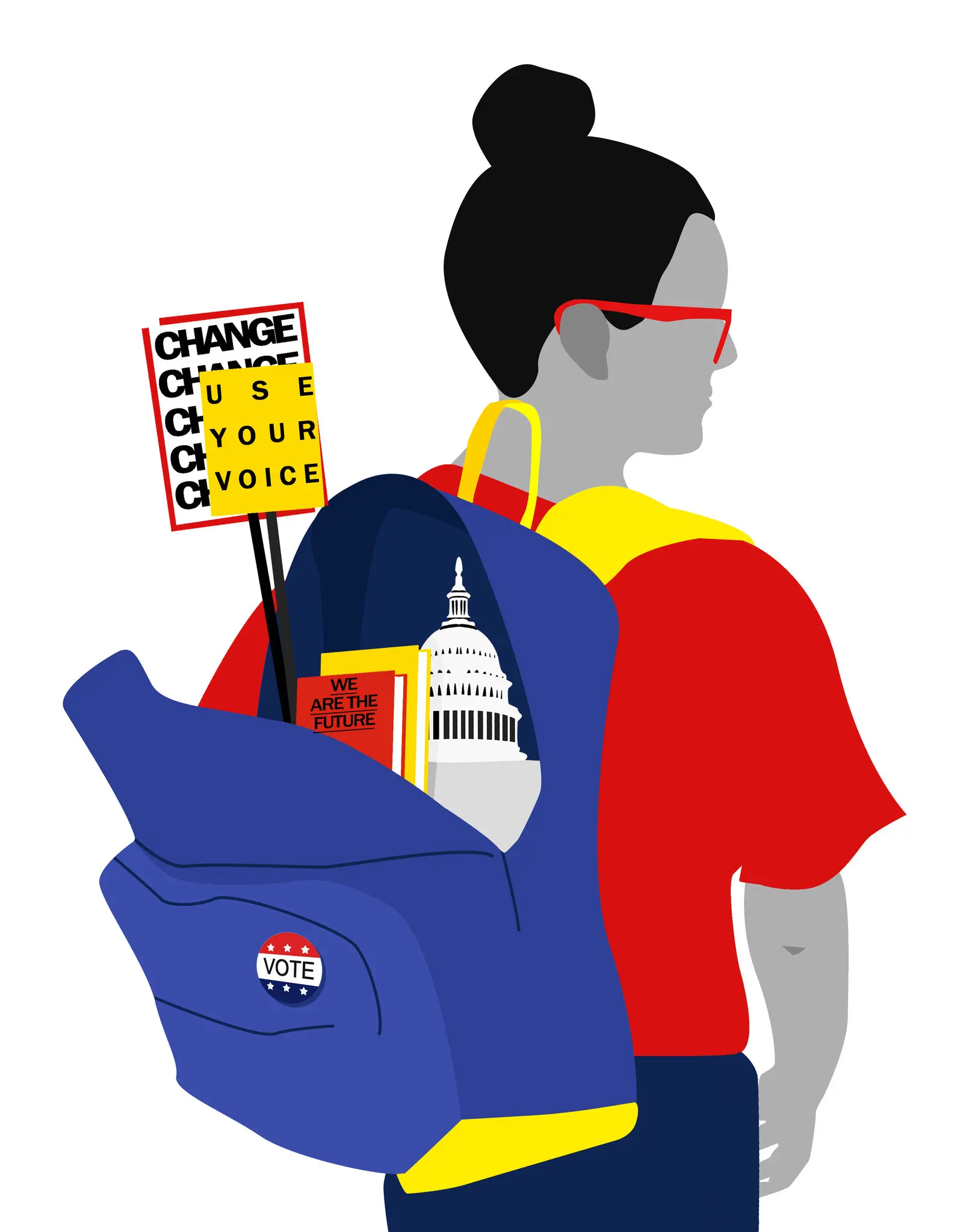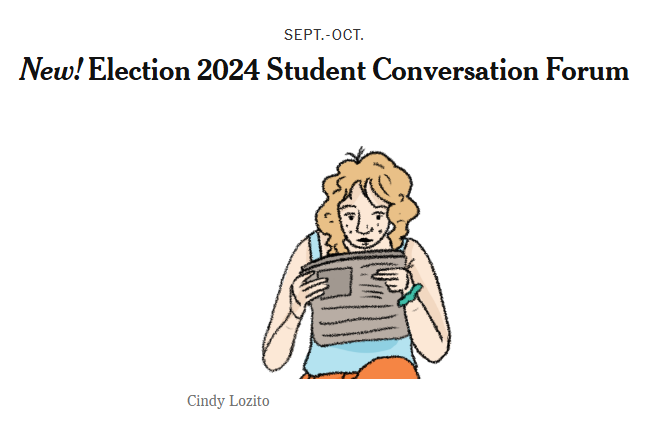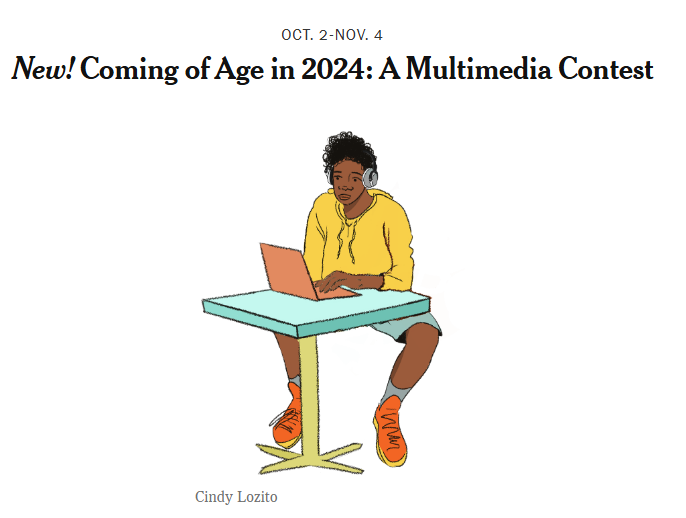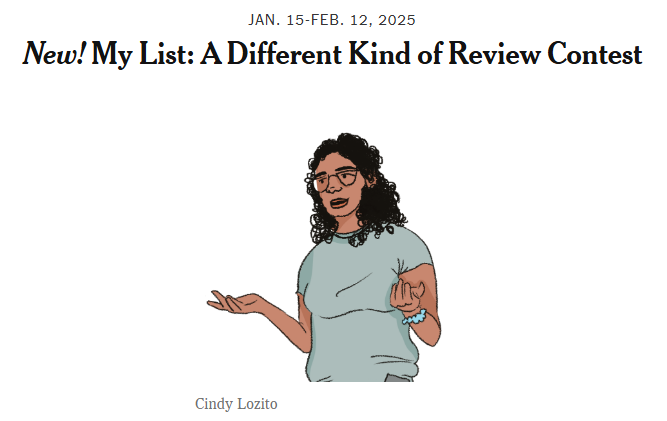我们邀请学生用 400 字或更少的字解释如何完成任何任务。
比赛日期:2025 年 2 月 12 日至 3 月 12 日
你知道怎么修理刹车灯吗?如何背诵莎士比亚呢?如何让金鱼活着?发现流星?写一封情书?原谅某人?
这些只是 2015 年至 2022 年每周在《纽约时报杂志》上发表的 Malia Wollan 的操作专栏 Tip 中解释的众多技能中的一小部分。
受这个专栏的启发,该专栏探讨了严肃和愚蠢的话题,我们挑战学生为(几乎)任何任务编写自己的“操作方法”。
只要主题适合家庭报纸,学生就可以解释他们喜欢的任何内容,包括 Tip 已经承担的任务。但是,就像专栏所做的那样,他们也必须找到、采访并引用该主题的一位专家。
请查看下面的完整指南和相关资源。
以下是您需要了解的内容:
挑战
以 The New York Times Magazine 中长期运行的 Tip 专栏为例,用 400 字或更少的字写一篇关于如何执行任务的描述。
那个任务可能是什么?任何适合家庭报纸且足够具体以至于您可以在字数限制内彻底解释它的东西都是公平的。我们希望您能从中选择中获得乐趣,我们提供了一系列提示来提供帮助。
例如,Tip 涵盖了广泛的主题,例如如何在鲨鱼袭击中幸存下来、排队等候、像猫头鹰一样鸣叫、不那么害怕黑暗、制作爱情药水和攀爬铁丝网围栏。因此,无论你选择写你已经知道如何做的事情,还是你想学习的东西,你对它的描述都应该清晰、信息丰富且引人入胜。
你的作品唯一的其他要求是你还必须找到、采访和引用该主题的一位专家。
如果您阅读了上面链接的任何 Tip 文章,您会注意到每个版本都是围绕对一位专家的采访构建的。在本次比赛中,我们要求学生做同样的事情:采访您选择的专家,并在您的最终作品中至少包含该人的一句话。
谁算作专家?这取决于你自己——唯一的规则是这个人不能和你有关系。选择对主题有足够了解的人,您的读者会信任他们的建议。
有时选择专家很容易。例如,为了解释如何选择一首卡拉OK歌曲,沃兰女士采访了一位世界卡拉OK冠军;关于如何推荐一本书,她与一位图书管理员进行了交谈;关于如何缝合伤口,她采访了一位医生。
但您选择的专家也可能是另类的。在一篇关于如何呼吸的专栏文章中,沃兰采访了一位单簧管演奏者;关于如何切馅饼,她与一位餐馆老板进行了交谈;在关于如何说再见的节目中,她采访了一位在职业生涯中告别了许多孩子的托儿所工作者。
一些附加规则
除了上述指南之外,以下是一些其他详细信息:
您必须是 13 至 19 岁的初中或高中学生才能参加,并且所有 18 岁以下的学生必须获得父母或监护人的许可才能参加。请参阅常见问题部分,了解更多资格详情。
作品基本上应该是你自己的——它不应该被抄袭、由他人撰写或由人工智能生成。
您可以采访您喜欢的主题的任何专家,只要那个人与您无关。
你的文章应该是本次比赛的原创作品。这意味着它在提交时不应该已经发表,无论是在校报上、为其他比赛还是其他任何地方。
请记住,你提交的作品应该适合时报的读者——也就是说,可以在家庭报纸上发表的东西(所以,请不要说脏话)。
每位学生只能提交一份参赛作品。虽然我们的许多比赛都允许学生以团队形式工作,但对于这个比赛,您必须单独工作。
作为您提交的一部分,您还必须提交一份描述您的创作过程的“艺术家声明”。这些陈述不会用于选择决赛选手,但有助于我们设计和完善我们的比赛。请参阅下面的常见问题解答以了解更多信息。
所有参赛作品必须在太平洋时间 2025 年 3 月 12 日晚上 11:59 之前提交,使用我们将在比赛开始时添加到本文底部的提交表格。
常见问题解答
关于写作的问题
1.什么是操作方法论文?
它就像它听起来的样子 — 一篇解释如何做某事的文章。它通常专注于一项特定任务并直接写给读者。操作方法是一种信息性写作,这意味着您写的一切都应该是真实的,并且基于事实和证据。(对于这项作业,该证据是您将找到并亲自采访的专家来源。
在你的文章结束时,你的读者应该明白如何完成你打算解释的任务,并获得一些他们可以实施的实用建议或工具。但他们也应该更广泛地了解这项技能的目的以及他们如何以及为什么使用它。请记住,除了清晰和信息丰富之外,您的文章还应该引人入胜。
2.我不确定该写什么。我应该从哪里开始?
我们的学生论坛提出了一系列问题,可以帮助您集思广益,构思主题。我们希望您不仅能贡献想法,还能阅读和回应他人的想法。
3.有什么我不能写的吗?
您可以涵盖任何您喜欢的主题,只要它适合家庭报纸,并且您可以用 400 字或更少的字数充分解释它。
4.谁算作“专家”,我如何找到一位进行面试?
您的专家不必是运动的世界冠军或组织的国家负责人才能拥有专业知识。此人可以是具有某个领域或主题的专业知识的任何人。例如,如果您正在写一篇关于如何开始观鸟的文章,您可以采访在当地公园或动物园工作的人、您所在城镇的观鸟团体的人或您个人认识的观鸟者,例如邻居或老师。
但我奶奶做的苹果派是世界上最好的。为什么我不能采访她,了解我的烘焙方法?
其中一个原因是我们想鼓励学生扩大他们的圈子并结识他们社区中的新朋友。
但更大的原因是,我们希望这个比赛,以及我们所有的比赛,都有助于教授新闻素养。在现实世界的新闻中,没有记者会被指派去报道他们自己的家庭。记者必须尽量保持客观和公正,采访你的祖母——或者你的父亲,或者你的堂兄——会导致自然的 “利益冲突”,因为很难客观地看待你的亲戚。为此,我们也希望您不要选择您的密友。本次比赛的目标之一是让您与不太了解的人交谈并向他们学习。
然而,好消息是,你可以推荐你的亲戚作为班上其他人可能的采访对象,欢迎他们采访你的祖母!
_________
关于评审的问题
1.我的作品将如何被评判?
您的作品将被《纽约时报》记者以及来自美国各地的 Learning Network 工作人员和教育工作者阅读。我们将使用此评分标准来评判参赛作品。
2.奖品是什么?
在 The Learning Network 上发布您的作品。
3.何时公布获奖者?
比赛结束大约两个月后。
4.我的论文没有被选为获胜者。你能告诉我为什么吗?
我们通常会收到数千份参赛作品,因此,不幸的是,我们的团队无法对个别学生的论文提供反馈。
_________
关于规则的问题
1.为什么你们要要求提供关于我们流程的艺术家声明?您将用它做什么?
我们所有在 The Learning Network 工作的人都曾是教师。现在我们在新闻编辑室而不是课堂上工作,我们错过的许多事情之一是能够实时看到学生对我们的 “作业” 的反应——并提供帮助或调整,以使这些作业变得更好。我们要求您反思您做了什么以及为什么,以及其中的困难或容易之处,这在很大程度上是为了改进我们的比赛和我们为支持它们而创建的课程。
另一个原因?我们从许多老师那里听说,写下这些陈述对学生有很大帮助。从作品中退后一步,试着用语言表达你想表达的东西,以及你为什么以及如何做出艺术选择来做到这一点,可以帮助你重新看待你的作品并弄清楚如何让它更强大。对于我们的员工来说,他们提供了重要的背景信息,帮助我们了解每个学生和提交的作品,并更多地了解世界各地儿童创作的条件。
我们不会使用您的陈述来选择我们的决赛入围者,也不会将它们与获奖作品一起发布。相反,它们将严格供我们的员工阅读。如果我们稍后决定使用这些声明发布有关学生流程的内容,我们会在引用您之前征求您的许可。换句话说,这是相当非正式的;做你自己,尽可能诚实地告诉我们你是如何工作的以及为什么。
2.谁有资格参加本次比赛?
该比赛面向世界各地的 13 至 19 岁初中或高中学生。大学生不能提交参赛作品。但是,正在参加一门或多门大学课程的高中生(包括高中研究生)可以参加。在魁北克省参加两年制 CEGEP 第一年的学生也可以参加。此外,19 岁或以下已完成高中学业但正在休学年或未上大学的学生可以参加。
《纽约时报》员工的子女和继子女没有资格参加本次比赛。与这些员工住在同一家庭的学生也不是。
3.如果我对本次比赛有疑问或在提交参赛作品时遇到问题,可以联系谁?
了解更多赛事详情、提交问题,均可扫码添加顾问老师咨询










